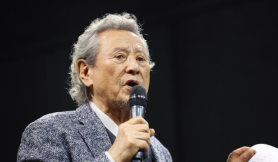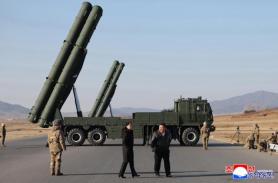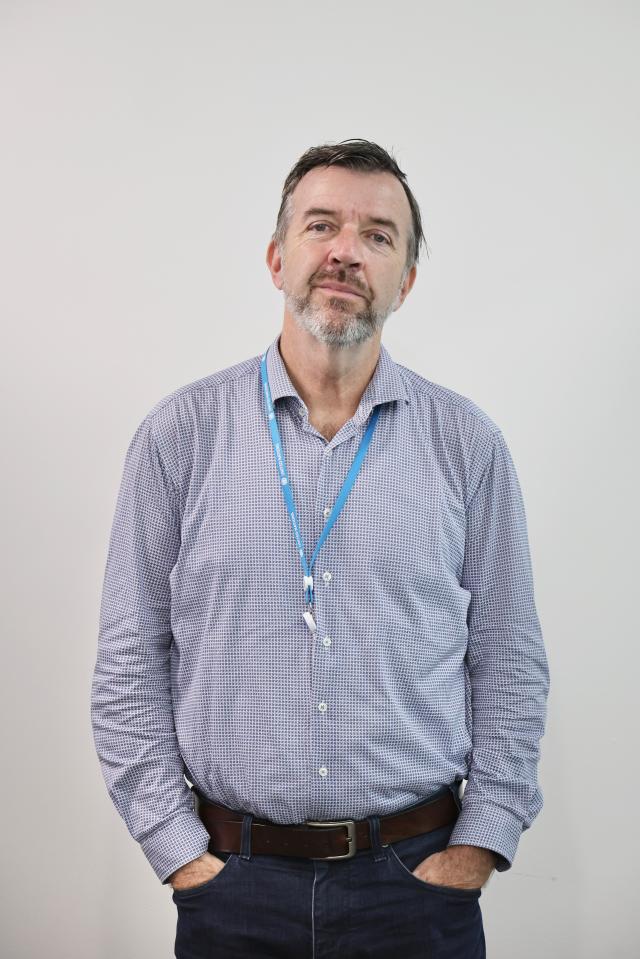
SEOUL, July 28 (AJP) - South Korea needs to develop a consistent stance on human rights in North Korea instead of one that changes every time there is a new government, according to a top UN official.
"There needs to be a sustainable approach to DPRK human rights," said James Heenan, Representative of the UN Human Rights Office in Seoul, using the official name of North Korea. "One that doesn’t change drastically every time there’s a new administration."
This is particularly necessary as in some areas the plight of North Koreans is deteriorating. "In some areas, such as movement restrictions and the use of the death penalty, things have clearly gotten worse," he said.
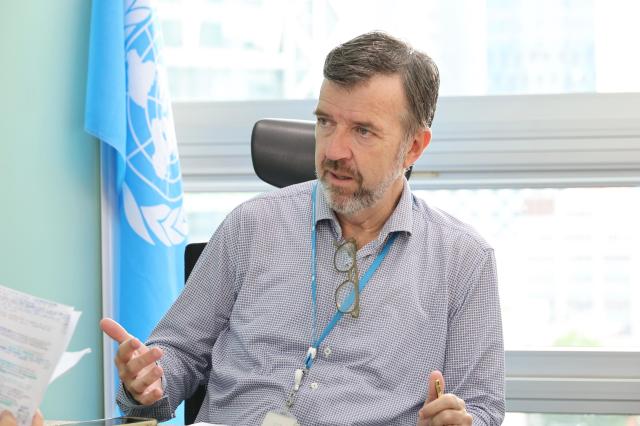 James Heenan is the representative of the UN Human Rights office in Seoul. AJP Han Jun-gu
James Heenan is the representative of the UN Human Rights office in Seoul. AJP Han Jun-guHeenan made the comments in an interview ahead of a new report on the human rights situation in North Korea set to be released in September.
The upcoming report, to be presented at the 60th session of the UN Human Rights Council, marks a decade since the 2014 Commission of Inquiry (COI), which exposed rights violations in North Korea.
The COI, which was a rare full-scale investigation into a non-conflict country, concluded that "systematic, widespread and gross" human rights violations had been committed in North Korea. The report cited arbitrary detention, torture, and severe restrictions on freedom of expression and movement.
In response, the Human Rights Council set up the OHCHR field office in Seoul in 2015, tasked with monitoring the situation in North Korea and collecting evidence for future accountability. As the office’s second representative, Heenan has been overseeing preparations for the 10-year follow-up report.
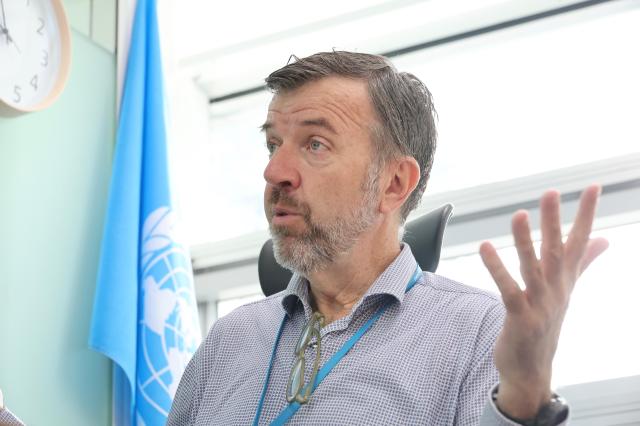 James Heenan, representative of the UN Human Rights Office in Seoul, speaks during an interview at the office on July 23, 2025. AJP Han Jun-gu
James Heenan, representative of the UN Human Rights Office in Seoul, speaks during an interview at the office on July 23, 2025. AJP Han Jun-gu"The Council asked for a report covering ten years of human rights in the DPRK," he said. "That’s a real challenge. But it allows us, for the first time in a while, to look at long-term trends."
"We’ve documented some small improvements, but also serious setbacks," he said. "Freedom of expression is more restricted now. It’s harder to express your views or access outside information, like Korean dramas, for instance."
In some areas, he said, "things have worsened."
Still, he stressed the UN’s purpose is not just to document abuses. "Our goal is to improve things. We don’t just produce reports or criticize. We look for patterns that help us find opportunities for change."
But getting the world’s attention remains difficult, he said, particularly now as there are so many crises in the world.
Another factor is that the Korean issue has lasted so long. "It’s been going on for over 75 years. There’s very little visual evidence—no images or videos like you see from other crises. And people tend to respond more to what they can see."
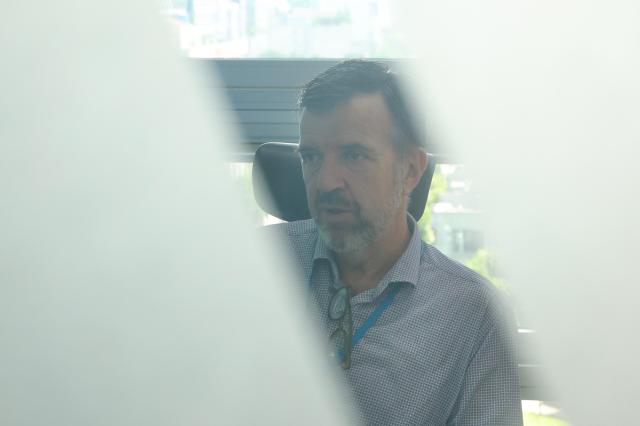
Still, Heenan believes this moment offers a critical opportunity. "In our reporting, we try to highlight the voices of victims," he said. "That’s one of the few ways to get people to care—both outside the Peninsula, and frankly, here in the Republic of Korea. Because I still find there’s a lack of interest in this country."
The new Lee Jae-Myung administration is currently reviewing whether to continue publishing the Ministry of Unification’s annual report on North Korean human rights. Since the enactment of the North Korean Human Rights Act in 2016, the ministry has been mandated to publish an annual report. While the 2017-22 Moon Jae-in administration kept it confidential, the Yoon Suk Yeol administration made it public.
"Whether making reports public is useful, that question applies to all reports, including ours," Heenan said. "If there’s no legal requirement, it’s up to the government to decide whether or not to release them."
"Transparency is something we at the UN generally support," he said. "So yes, in general, public information is more useful. Public reporting has value. Private reporting can also be useful, especially when you're trying to engage quietly before going public. Many organizations do that, sharing concerns with a party before media coverage. So both public and private reports have value."
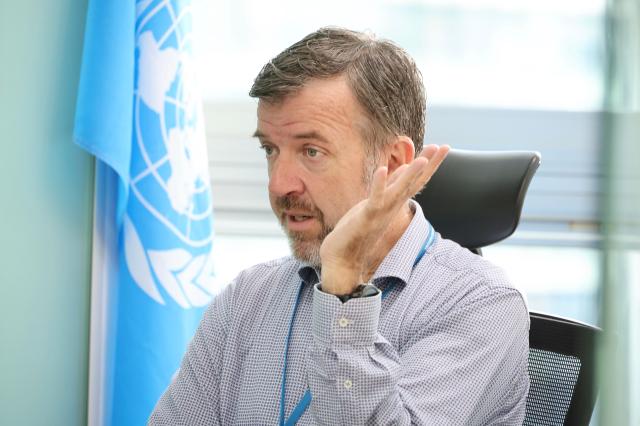 James Heenan, representative of the UN Human Rights Office in Seoul, speaks during an interview at the office on July 23, 2025. AJP Han Jun-gu
James Heenan, representative of the UN Human Rights Office in Seoul, speaks during an interview at the office on July 23, 2025. AJP Han Jun-guOn domestic engagement, Heenan called for a shift in perspective. "In many places, people say human rights are political because they deal with the power relationship between the individual and the state," he said. "But here in the Republic of Korea, DPRK human rights are particularly politicized. No other two countries are this intertwined. It’s one peninsula."
The UN office regularly consults with North Korean escapees. "We ask them what they want in terms of accountability, support, and future prospects," Heenan said. "And many tell us they don’t want to get involved in this work because it’s too politicized. Once they speak out, people assume they’ve chosen a side."
"That’s really concerning," he said. "Human rights should not be politicized like that. But people in positions of responsibility here need to find a way."
Copyright ⓒ Aju Press All rights reserved.


